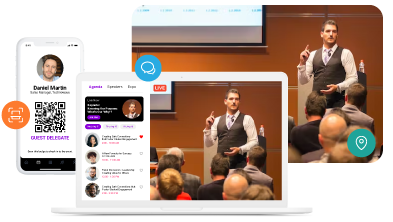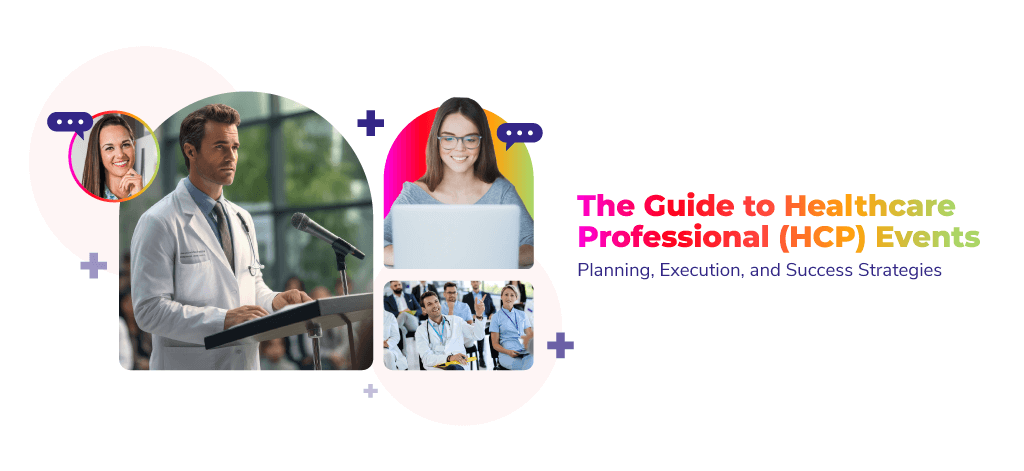To succeed in executing healthcare professional events (HCPs) like conferences, symposiums, workshops, and webinars, staying one step ahead is a necessity. These events are known for providing a platform where you can share knowledge, and experience peer-to-peer learning, along with fostering collaborations within the medical community. But it’s crucial to ensure that HCP events are not only informative but also engaging and successful.
In this comprehensive guide, we are going to discuss planning, execution and strategies for HCP events. Also, we’ll talk about how these strategic elements will help you turn your HCP event into an immersive hub for healthcare professionals.
What are HCP Events?
Healthcare Professional events (HCPs events) are gatherings which are specially designed to educate and connect with medical professionals. These can be conferences, workshops, symposiums, or even webinars. They offer a valuable platform for HCP events to learn about the latest advancements in treatments, technologies, and research. They can also network with colleagues, discuss challenging cases, and stay updated on industry trends. Moreover, these events benefit both participants and organizers which further fosters collaboration and brand awareness within the healthcare community.
Why do HCP Events Matter?
Despite the rise of virtual and hybrid formats, HCP events themselves have not lost their significance. Organizers as well as participants (HCPs) benefit from them in many ways:
HCP Engagement:
Let’s suppose a nice vibrant space where all the healthcare professionals come along and discuss the latest advancements. These trends can be based on medical trends, treatments, technologies and new research. And that’s exactly what HCP events provide. These gatherings offer an interactive environment for HCPs to learn, discuss, and network. They can:
- Deepen their knowledge: HCP events come with a platform where the latest trends are discussed between healthcare professionals. Also, these events offer presentations, workshops, and discussions led by experts,
- Exchange ideas & best practices: Networking with colleagues allows HCPs to share experiences, discuss challenging cases, and learn from each other’s approaches.
- Stay connected: Events foster a sense of community within the healthcare field, allowing HCPs to build lasting connections with peers.
Brand Awareness and Education:
For the people who organize HCP events, they’re a great way to promote their brand and teach others about what they do. They can:
- Show off what they know: Events give organizations a chance to show how much they know about healthcare.
- Introduce new things: Organizers can use events to tell people about new products, services, or research.
- Make friends: Events help organizations connect with healthcare professionals and build relationships that last.
Continuing Medical Education (CME):
Many HCP events offer CME credits, which are essential for healthcare professionals to maintain their licenses and certifications. Attending these events allows HCPs to fulfill their CME requirements while gaining valuable knowledge and skills.
The Rise of HCP Event Platforms and Hybrid Events
Traditionally, HCP events were in-person meetings which were known for bringing healthcare professionals together for learning and networking. However, in recent years, these HCP events have witnessed a significant shift towards virtual and hybrid formats. This evolution is driven because of several key factors such as:
- Accessibility: When it comes to the way of participating, with virtual platforms, that has also changed. Gone are the days of limitations like travel costs, Visas, or Time/Zone differences. HCPs from anywhere in the world can attend the event without any geographical barrier. This further fosters a more inclusive learning environment for the healthcare community globally.
- Cost-Effectiveness: Earlier, when HCP events used to be in in-person format, it included a lot of expenses. But with virtual events, organizers easily save on venue rentals, catering, and travel costs for speakers. Whereas for attendees, travel, and accommodation expenses are eliminated.
- Flexibility: Thanks to online platforms, HCPs with hectic schedules may now attend sessions whenever it’s convenient for them. Session recordings provide even more flexibility by enabling participants to review material or make up for missed sessions at a later time.
- Global Reach: Hybrid events which are known for combining in-person and virtual elements, offer the best of both worlds. They allow for a wider audience to participate which fosters collaboration and knowledge exchange across the globe. This creates a truly global platform for healthcare professionals to connect and learn from each other.
How To Harness The Power of HCP Event Platforms?
HCP event platforms are specialized software solutions designed to streamline the planning, execution, and management of HCP events. Here’s how these platforms can enhance your event:
Streamlined Registration & Management:
When it comes to organizing and executing an HCP event, it’s very important to ensure seamless registrations and overall management. In such events, HCP event platforms simplify event registration, manage attendee data, handle automated emails, and streamline everything. As a result, it frees up time for organizers so that they can focus on other aspects of their tasks.
Live Streaming & On-Demand Access:
Whether participants participate in-person HCP events or virtually, features like secure live-streaming, recording, and on-demand access to sessions guarantee that all content is available to them.
Interactive Features:
To captivate attendees in HCP events, these platforms offer interactive features such as live polls, surveys, Q&A sessions, live chats, and reactions along with breakout rooms. These features encourage participation from both formats; in-person and virtual events.
Networking Tools:
Using virtual lobbies, chat rooms, and individual messaging options will help promote networking in a virtual environment.
Data & Analytics:
Using an HCP event platform, you can gain insight into post-event comments, popular sessions, attendee demographics, and engagement with content after the event. As a result of the data collected, future events can benefit. Moreover, attendees’ experiences can be customized based on this information.
HCP Engagement Strategies: Turning Participants into Active Learners
Believe it or not, effective HCP engagement is key to maximizing the value of your event. Here are some strategies to consider:
Focus on Learning Objectives:
Begin by determining the learning objectives of HCPs that need to be achieved by attending the event. Therefore, tailor the content management and speaker selection to meet the needs and interests of attendees in the events.
Interactive Sessions:
Use interactive methods to keep participants actively involved and improve information retention, such as case studies, panel discussions with audience involvement, live demonstrations, and surveys or quizzes.
Pre-Event Content & Gamification:
To generate interest and encourage participation prior to the event, create educational content like quizzes, live polls or surveys beforehand. Think about gamifying these events by giving either badges or points for participation, which will promote healthy rivalry among participants.
Social Media Integration:
Use influencers in the healthcare industry or targeted advertising efforts to spread the word about the event on HCP-relevant social media channels. To foster community building and pre-event participation, make use of tools such as live tweeting and starting discussion threads with event hashtags. In addition to this, utilize social media platforms like Instagram, LinkedIn, WhatsApp etc., and implement target advertising to reach a target audience.
Post-Event Follow-Up:
Provide guests with access to presentations, event recordings, key takeaways, and other resources. Surveys should be conducted after the event to get input on the format, content, and overall experience. Make constant improvements to future events by utilizing this input.
Community Building Features:
In order to facilitate connections and information sharing among attendees beyond the event’s duration, several HCP event platforms come with elements like discussion forums or online communities. As a result, this encourages continued participation and fortifies the bonds established.
Conclusion
By the end of this article, we know that planning a successful healthcare professional event takes work. You need to think about everything from organizing it well to keeping everyone involved and having a good time. These events are a great way for healthcare workers to learn new things, meet each other, and build a good reputation for their companies. Moreover, to keep everyone engaged, make sure they know what they’ll learn at the HCP events. Additionally, plan activities where professionals can talk to each other and do things together. You can even send out information before the event and use games to make things more interesting. Don’t forget to utilize social media and following up after the event.
Create an Extraordinary Event Experience
Across All Event Formats




















